Fleta Jan Brown came from humble beginnings, yet she was able to write herself into a position as one of the more prolific top-notch lyricists and composers of the ragtime era. She was the only child born in or around Sioux Rapids, Iowa, just north of Storm Lake in the northern part of the state, to barber William Edward Brown and his wife Jennie Etta Watkins. Given the rural location it seems probable that any musical training Fleta received was more likely from a private teacher than in the schools. The family was found living in Sioux Rapids for the 1895 Iowa census, and in Storm Lake 1900 for the Federal census. Later that year Fleta struck out for Cincinnati, Ohio where she attended the Cincinnati Conservatory of Music, studying piano, theory and harmony with Fannie Zeisler among others.
After graduating from the conservatory, Fleta relocated to St. Louis, Missouri, where she started her songwriting career with no less than three, and perhaps more, tunes, that were published in 1905. These were followed by several more in 1906, including her Tangle Foot Rag and an art song cycle about love.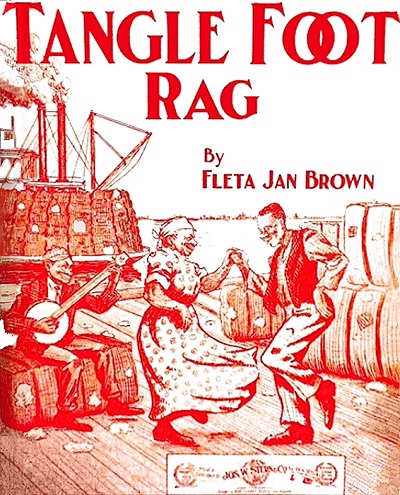 Fleta was also given good notices for her performances around town, often comprised of classical selections for various social groups. While St. Louis was an appealing place to live, even after the 1904 Louisiana Purchase Centennial Exposition had folded up, it had limited opportunity for an ambitious female songwriter. After a few more publications in 1907, Fleta married composer Herbert Lewis Spencer, who had been working for Thiebes Stierlin Music in St. Louis, in September, and immediately the pair set out for Manhattan to light Tin Pan Alley on fire.
Fleta was also given good notices for her performances around town, often comprised of classical selections for various social groups. While St. Louis was an appealing place to live, even after the 1904 Louisiana Purchase Centennial Exposition had folded up, it had limited opportunity for an ambitious female songwriter. After a few more publications in 1907, Fleta married composer Herbert Lewis Spencer, who had been working for Thiebes Stierlin Music in St. Louis, in September, and immediately the pair set out for Manhattan to light Tin Pan Alley on fire.
 Fleta was also given good notices for her performances around town, often comprised of classical selections for various social groups. While St. Louis was an appealing place to live, even after the 1904 Louisiana Purchase Centennial Exposition had folded up, it had limited opportunity for an ambitious female songwriter. After a few more publications in 1907, Fleta married composer Herbert Lewis Spencer, who had been working for Thiebes Stierlin Music in St. Louis, in September, and immediately the pair set out for Manhattan to light Tin Pan Alley on fire.
Fleta was also given good notices for her performances around town, often comprised of classical selections for various social groups. While St. Louis was an appealing place to live, even after the 1904 Louisiana Purchase Centennial Exposition had folded up, it had limited opportunity for an ambitious female songwriter. After a few more publications in 1907, Fleta married composer Herbert Lewis Spencer, who had been working for Thiebes Stierlin Music in St. Louis, in September, and immediately the pair set out for Manhattan to light Tin Pan Alley on fire.It did not take long for their careers to ignite. Accepted in short order by the M. Witmark and Sons publishing house, Spencer and Brown, and even Brown without Spencer, started churning out a piece every few weeks or less, some of enough quality to make them a hit. Although much of the time Fleta was credited with the lyrics and Herbert with the music, it was a two-way process with input from both sides, and she had little trouble writing her own instrumentals and songs as well. Barely ten months in Manhattan, Fleta received this notice in the Music Trade Review of July 25, 1908:
Among the new music issued by M. Witmark & Sons this week are two new high-class songs by Fleta Jan Brown, which show this brilliant young writer to possess extraordinary versatility. They form a part of a series of four new numbers by the same composer, and they are enclosed in a special decorative cover in keeping with their high order.
One song in particular from 1908 helped the couple gain a good financial foothold based on its sales, but also generated a humorous story. It was enough of a hit that the Spencers felt like they could actually relax a little, but the household help thought otherwise:
Herbert Spencer and Fleta Jan Brown... have resolved never to discuss their private affairs before their servant again. [They] are the writers of "Pansies Mean Thoughts and Thoughts Mean You,"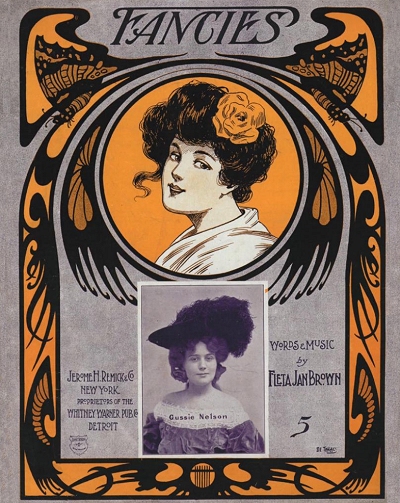 one of the big ballad successes of the present season, and as they are both greatly interested in this song they are prone to talk a great deal about it.
one of the big ballad successes of the present season, and as they are both greatly interested in this song they are prone to talk a great deal about it.
 one of the big ballad successes of the present season, and as they are both greatly interested in this song they are prone to talk a great deal about it.
one of the big ballad successes of the present season, and as they are both greatly interested in this song they are prone to talk a great deal about it.Recently Mrs. Spencer added a window box to the furnishings of their apartment, and through sentiment planted pansies in it. Mary, the cook, helped her to do the planting and was greatly interested in it. However, Mary did not know that Mr. and Mrs. Spencer were the authors, of the "pansy" song.
At the dinner table the other night the Spencers were planning out what they would do with the "pansy" money (meaning their royalties on the song). The cook was an attentive listener to the conversation.
The following Saturday, after receiving her pay, she informed Mrs. Spencer that she was going to leave.
"Why, what on earth is the trouble, Mary?" asked Mrs. Spencer. 'Haven't we treated you well?"
"Oh, yis," replied the servant, "Oi can't complain on thot schore."
"Then whatever is the trouble?"
"Oi heard yet tellin' the boss the other evenin' thot yet was depending on thot little box uv pansies in the windy for yer income the rist av the year, an' oi'm afraid yez can't afford to pay me wages on that skimpy flower garden"
The husband and wife team had the added benefit of talent, both of them able to play the piano and sing, so undertook some stage appearances on the vaudeville circuit, initially along the East Coast, to entertain and sell their songs. While nowhere near the caliber of Nora Bayes and Jack Norworth, they still got favorable reviews based on the songs they wrote and presented.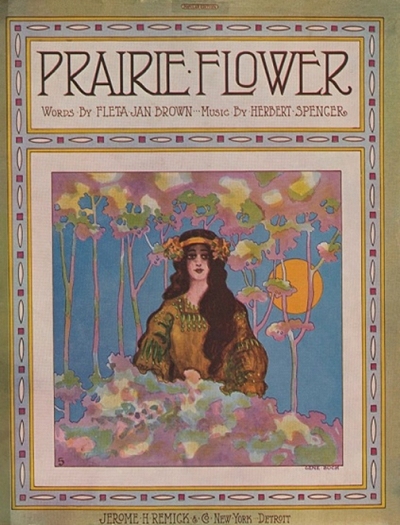 The 1910 census taken in Manhattan showed Herbert as a theater musician, Fleta as a musical writer, and her father, William Brown, who was temporarily lodging with them, as a corporation manager, a far cry from his prior tonsorial career.
The 1910 census taken in Manhattan showed Herbert as a theater musician, Fleta as a musical writer, and her father, William Brown, who was temporarily lodging with them, as a corporation manager, a far cry from his prior tonsorial career.
 The 1910 census taken in Manhattan showed Herbert as a theater musician, Fleta as a musical writer, and her father, William Brown, who was temporarily lodging with them, as a corporation manager, a far cry from his prior tonsorial career.
The 1910 census taken in Manhattan showed Herbert as a theater musician, Fleta as a musical writer, and her father, William Brown, who was temporarily lodging with them, as a corporation manager, a far cry from his prior tonsorial career.While the Spencers were working primarily for Witmark, they apparently did not have an exclusive long-term contract with the firm, as Spencer and Brown songs started showing up under the Jerome H. Remick imprint in 1911. By 1913 Fred B. Haviland was getting a taste of their music as well, and the Spencers appeared under three different imprints for some time. Also in 1913, the pair was engaged by Jesse Villars to co-write a musical tabloid stage work for an Irish tenor, Ireland As It Is. Among Fleta's most popular solo songs of the time was In the Candle-Light, released as both a song and an instrumental. Together, the couple penned Underneath the Stars in 1915, scoring yet another moderate hit, certainly more than enough to pay the staff at home.
The Spencers slowed down a bit after war broke out in Europe, and then engaged the American Armed Forces, but they continued to write under contract to Remick Music. Herb and Fleta contributed surprisingly little in the way of war-time anthems or ballads, focusing on more mainstream relationship or location topics.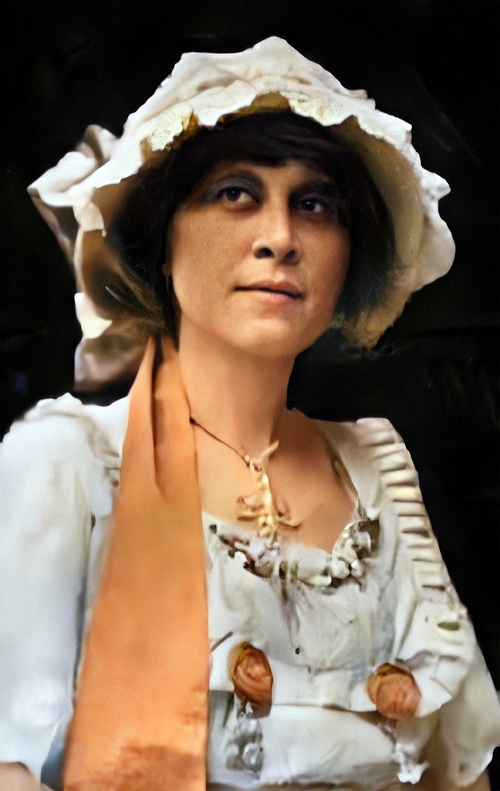 Fleta co-wrote two very similar "after the war" pieces with composer Peter De Rose around the time of the armistice in Europe, but quickly resumed focusing on Araby and flowers, etc. In 1920 Witmark decided that they wanted exclusive use of the Spencers' services, so hired them both on as exclusively contracted staff writers. Just the same, their output slowed greatly for a couple of years, which may have been problematic for their employer. The Spencers still had enough credibility and catalog to be admitted to ASCAP in 1920.
Fleta co-wrote two very similar "after the war" pieces with composer Peter De Rose around the time of the armistice in Europe, but quickly resumed focusing on Araby and flowers, etc. In 1920 Witmark decided that they wanted exclusive use of the Spencers' services, so hired them both on as exclusively contracted staff writers. Just the same, their output slowed greatly for a couple of years, which may have been problematic for their employer. The Spencers still had enough credibility and catalog to be admitted to ASCAP in 1920.
 Fleta co-wrote two very similar "after the war" pieces with composer Peter De Rose around the time of the armistice in Europe, but quickly resumed focusing on Araby and flowers, etc. In 1920 Witmark decided that they wanted exclusive use of the Spencers' services, so hired them both on as exclusively contracted staff writers. Just the same, their output slowed greatly for a couple of years, which may have been problematic for their employer. The Spencers still had enough credibility and catalog to be admitted to ASCAP in 1920.
Fleta co-wrote two very similar "after the war" pieces with composer Peter De Rose around the time of the armistice in Europe, but quickly resumed focusing on Araby and flowers, etc. In 1920 Witmark decided that they wanted exclusive use of the Spencers' services, so hired them both on as exclusively contracted staff writers. Just the same, their output slowed greatly for a couple of years, which may have been problematic for their employer. The Spencers still had enough credibility and catalog to be admitted to ASCAP in 1920.Perhaps hoping to refresh themselves a bit, Herbert and Fleta started hitting the boards more, going on a couple of vaudeville tours in the 1920s to mixed reviews. While their output remained diminished from the 1910s, they still managed some fine pieces through the mid-1920s. One song in particular got some notice in the trades, as relayed by the Music Trade Review in the August 16, 1924 issue:
Featured: A sensation is promised when "Funny Face," a new melody fox-trot hit by Herbert Spencer and Fleta Jan Brown, is produced on a very lavish scale with marvelous costume effects in Hassard Short's coming Broadway production, entitled the "Ritz Revue." "Funny Face" was selected by a jury of well-known artists, stage directors and others in the production who were sent out in quest of the greatest novelty they could find for the purpose. They unanimously awarded the crown to "Funny Face." The E. B. Marks Music Co. will publish the number.
Major changes were due for copyright law, and many musicians and composers were interested in expressing their intellectual rights through new rules. Fleta divided some of her time in 1926 between New York and Washington, D.C., as she was on the committee to add protective amendments to the current copyright laws. Herbert had some plans of his own at this time. Following a 1925-1926 stint by the couple on the B.F. Keith vaudeville circuit, he decided to make his own attempt at running, or at least sharing a publishing firm, as noted in the Music Trade Review of January 1, 1927:
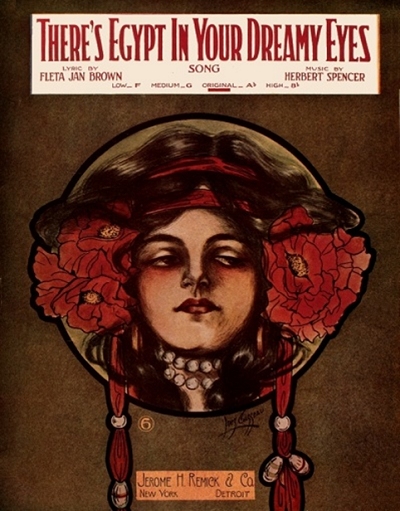
The latest addition to the music publishing field is the firm of Sheffield & Spencer, Inc. Heads of the firm are two well-known members of the music industry, George Sheffield, a recording manager, having been associated with the Aeolian Co. for a number of years, and Herbert Spencer, the other member of the firm, one of the best known of present-day song writers and one who has had a measure of success for over twenty years. He has been associated with such publishing firms as Jerome H. Remick & Co. and M. Witmark & Sons. Among his best known songs are "Underneath the Stars," "Egypt," "In Your Dreamy Eyes," "In the Candlelight," "Me Neenyth" [sic] and others. He recently concluded a tour of the Keith circuit with his wife Fleta Jan Brown, who collaborates with him writing the lyrics to his melodies.
As it turns out, 1927 would see the final song from Fleta and Herbert. They may have collaborated now and then with other writers, but it is difficult to find anything with his or her name attached to it published after 1927. In the 1930 census taken in Bedford, Westchester County, New York, Herbert was still listed as a theater musician and Fleta as a music author. Little was found on her final years. Fleta Jan Brown Spencer left her husband behind when she died at age 56 in 1938. He continued to apply copyright renewals to their collective works into the 1940s, perhaps hoping for a revival of their music someday. Herbert Spencer died in August of 1944. While Brown and Spencer songs have not quite enjoyed the success of some of the more popular writers of their time, they still made a mark in the field, and Fleta made it quite clear that gender should not be a determining factor of talent and ability.
 Compositions
Compositions